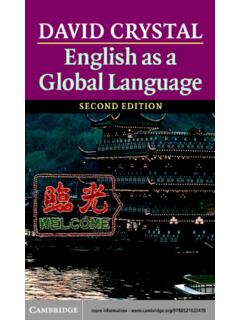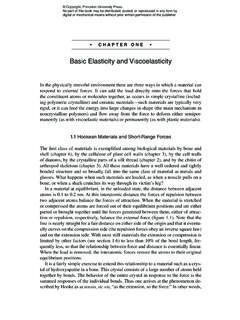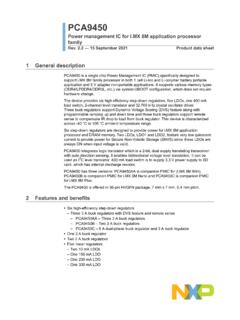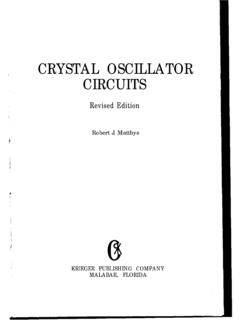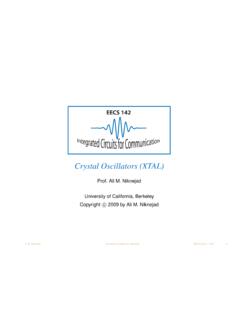Transcription of English as a global language - Cultural Diplomacy
1 EnglishasagloballanguageSecondeditionDav id Crystal,world authority on the Englishlanguage, presents a livelyandfactual account of the rise of English as a global language and ex-plores the whys and wherefores of the history, current status and futurepotential of Englishas the international languageof communication. En-glish has beenlauded as the most successful language ever, with 1,500millionspeakers worldwide; but Crystalavoids taking sides and tells thestory in a measured but engaging way, backed by facts and figures. Thisnew edition of his classic book contains extra sections (on subjects in-cluding the linguistic features of New Englishes, the future of English asa world language , and the possibility of an English family of languages),footnotes and a full bibliography. There are updates throughout. This isa book for anyone of any nationality concerned with English : teachers,students, language professionals, politicians, general readers and anyonewith a love of the CRYSTALis one of the world s foremost authorities on is author of the hugely successfulCambridge encyclopedia of language (1987; second edition 1997),Cambridge encyclopedia of the Englishlanguage(1995), language death(2000), language and the Internet(2001) andShakespeare s words(2002, with Ben Crystal).
2 An interna-tionally renowned writer, journal editor, lecturer and broadcaster, hereceived an OBE in 199 5for his services to the study and teaching ofthe English language . His edited books include several editionsofTheCambridge encyclopedia(1990 2000) and related publications,Wordson words(2000, with Hilary Crystal) andThe new Penguin encyclopedia(2002).Englishasagloballangu ageSecondeditionDAVID CRYSTAL Cambridge, New York, Melbourne, Madrid, Cape Town, Singapore, S o PauloCambridge University PressThe Edinburgh Building, Cambridge , United KingdomFirst published in print format - - - - - - - - - - - - - - - David Crystal 1997, 20032003 Information on this title: book is in copyright. Subject to statutory exception and to the provision ofrelevant collective licensing agreements, no reproduction of any part may take placewithout the written permission of Cambridge University Press. - - - - - - - - - - - - Cambridge University Press has no responsibility for the persistence or accuracy of s for external or third-party internet websites referred to in this book, and does notguarantee that any content on such websites is, or will remain, accurate or in the United States of America by Cambridge University Press, New (NetLibrary)eBook (NetLibrary)hardbackContentsList of tablespageviiPreface to the second editionixPreface to the first editionxii1 Why a global language ?
3 1 What is a global language ?3 What makes a global language ?7 Why do we need a global language ?11 What are the dangers of a global language ?14 Could anything stop a global language ?25A critical era272 Why English ? The historical context29 Origins30 America31 Canada36 The Caribbean39 Australia and New Zealand40 South Africa43 South Asia46 Former colonial Africa49 South-east Asia and the South Pacific54A world view59vContents3 Why English ? The Cultural foundation72 Political developments78 Access to knowledge80 Taken for granted834 Why English ? The Cultural legacy86 International relations86 The media90 The press91 Advertising93 Broadcasting95 Cinema98 Popular music100 International travel104 International safety106 Education110 Communications114 The right place at the right time120 5 The future of global English123 The rejection of English124 Contrasting attitudes: the US situation127 New Englishes140 The linguistic character of new Englishes147 Grammar147 Vocabulary158 Code-switching164 Other domains168 The future of English as a world language172An English family of languages?
4 177A unique event?189 References192 Index202viListoftables1 Speakers of English in territories where thelanguage has had special relevancepage622 Annual growth rate in population in selectedcountries, 1996 2001713(a) Some differences in British and Americanadverbial usage150(b) Specific adverb+adjective pairs showingdifferences in conversational usage1504 Some potentially distinctive grammaticalfeatures of New Englishes153 5 Some distinctive collocations and idiomsnoted in Pakistan, Nigeria and Ghana163viiPrefacetothesecondeditionAlth oughEnglish as a global languagedid not appear until 1997,it was actually written in 1995, which in 2002 seems a very longtime ago, as far as global linguistic developments are 1990s were a revolutionary decade, in that respect, with aproliferation of new linguistic varieties arising out of the world-wide implementation of the Internet, an emerging awareness ofthe crisis affecting the world s endangered languages, and an in-creasingly public recognition of the global position of publications relating to this last topic seriously increasedin number and weight.
5 The largely article-driven literature of pre-vious decades had typically been exploratory and programmatic,restricted to individual situations, anecdotal in illustration, lackinga sociolinguistic frame of reference, and focusing on the written(and usually literary) language . By contrast, the 1990s saw theemergence of a more comprehensive perspective in which spokenvarieties became prominent, there was a real increase in theamount of descriptive data, and attempts were made to arrive atexplanations and to make predictions of an appropriately generaland sociolinguistically informed particular, several book-length treatments of English ap-peared, each providing a personal synthesis of previous observa-tions and speculations, and focusing on the phenomenon of globalEnglish as an end in itself. By the end of the decade, the differ-ent attitudes had highlit a number of important theoretical issues,ixPreface to the second editionand made it possible to see the various kinds of focus adopted byindividual authors.
6 I came to see the first edition of the presentbook, as a consequence, more clearly as predominantly a retro-spective account, examining the range of historical factors whichhave led to the current position of English in the world. Althoughavoiding firm predictions about the future, I thought it likely thatEnglish has already grown to be independent of any form ofsocial control (1st edition, p. 139). In my view the momentumof growth has become so great that there is nothing likely to stopits continued spread as a global lingua franca, at least in the fore-seeable future. Other books took different perspectives. For ex-ample, David Graddol sThe future of English , published in 1998,looked towards the future, beginning with the present-day situa-tion, and examining the contemporary trends likely to affect thelanguage s eventual role. For him, English is certainly the unpredictability inherent in language use, hesuggested that the current global wave of English may lose mo-mentum (p.)
7 60) and saw the real possibility of new language hier-archies emerging in the next century, with English holding a lessglobal position. Then Tom McArthur, inThe English languages,also published in 1998, adopted a more synchronic perspective,moving away from a monolithic concept of English . His primaryfocus was on the kinds of variation encountered in the language asa consequence of its global spread. He suggested that English wasundergoing a process of radical change which would eventuallylead to fragmentation into a family of languages .The role of these books has been to underline some of the pa-rameters of inquiry which must influence the next wave of empir-ical studies. From a stage when there were few general hypothesesto motivate research, we now have a multiplicity of them. Someare issues relating to language use: several political, economic,demographic and social factors have been identified as potentialinfluences on world language presence, all of which have been rec-ognized as operating at local regional levels, such as in relation tominority languages or endangered languages; however, the role ofsuch factors at a global level remains virtually unexplored.
8 Othersare issues affecting language structure: the way in which regionaland social factors influence the growth of language varieties andxPreface to the second editionfoster linguistic change has formed much of the subject-matter ofsociolinguistics and dialectology; but here, too, there is as yet littleunderstanding of what happens when these processes begin to op-erate at a macro level. To take just one example: the radical diver-sification envisioned by McArthur could have several outcomes,certainly including the development of an English family of lan-guages, but also resulting in various forms of multiglossia (goingwell beyond current conceptions of diglossia), the emergence ofmore complex notions of standard , and different kinds of multi-dialectism. We have as yet no adequate typology of the remarkablerange of language contact situations which have emerged as a con-sequence of globalization, either physically ( through popu-lation movement and economic development) or virtually ( Internet communication and satellite broadcasting).
9 I originally wroteEnglish as a global languageas (what I hopedwould be) a straightforward read, and chose not to impede theflow for a general reader by providing an array of academic foot-notes and a full bibliographical apparatus. When I wanted to makea specific reference, I incorporated it into the text. I think now,several years on, things have changed, with very much more liter-ature available to refer to, and more points of view to take into ac-count, so for this new edition I have adopted a more conventionalacademic style of presentation. As far as content is concerned, themain change has been an expanded chapter 5, which now includesa long section illustrating and discussing the structural featuresof New Englishes . This too has been the consequence of themuch greater availability of descriptive studies of individual varie-ties than was the case a decade ago. Finally, all population figuresand estimates of usage have been updated to the year CrystalHolyheadPublisher s note:The publisher has used its best endeavours to ensure that the URLs for external web-sites referred to in this book are correct and active at the time of going to , the publisher has no responsibility for the websites and can make no guar-antee that a site will remain live or that the content is or will remain has all happened so quickly.
10 In 1950, any notion of English as atrue world language was but a dim, shadowy, theoretical possibil-ity, surrounded by the political uncertainties of the Cold War, andlacking any clear definition or sense of direction. Fifty years on,and World English exists as a political and Cultural reality. Howcould such a dramatic linguistic shift have taken place, in less thana lifetime? And why has English , and not some other language ,achieved such a status? These are the questions which this bookseeks to time is right to address these issues. Thanks to progress insociolinguistics, we now know a great deal about the social andcultural circumstances which govern language status and change,and several encyclopedic surveys have made available detailed in-formation about world language use. There is also an increasinglyurgent need for sensitive discussion. In several countries, the roleof English has become politically contentious, and arguments haveraged about its current and future status.
